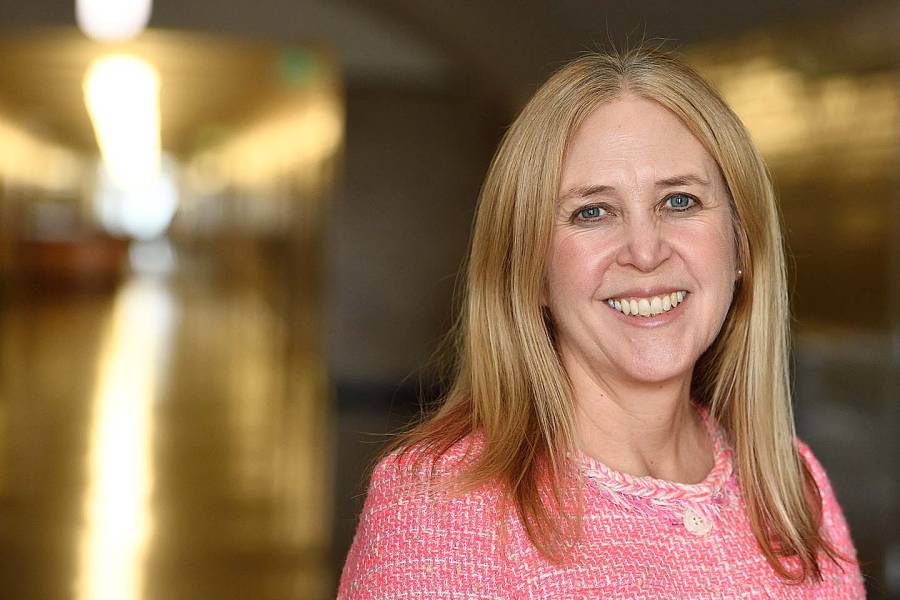Meredith Stewart was incredulous upon learning that her mother, an elementary school teacher, had to stop teaching with each pregnancy once she began to show. "I was gobsmacked that they made her stop working," Stewart says. "Obviously a lot has changed since then, and for the better."
No doubt her mother's experience—a little more than 50 years ago—helped Stewart hone her growing sensitivity to the importance of work/family life balance. At Hopkins, she is always thinking about changes that will enhance the intersection between the two, mindful that employers play a critical role in recognizing and responding to the needs of their employees outside the workplace. This means going beyond the traditional benefits—salary, medical, retirement—that most companies provide. As executive director of Johns Hopkins University's Total Rewards programs, she leads in the design, development, and implementation of an increasing number of innovations aimed at supporting employees and ensuring they are happy.
"We hope that their 'take' from our benefits is that we are an inclusive place to work," she says. "Think about why you work for any organization. Of course, some of it is your pay, but there are other reasons. A paycheck is only one piece of it. All the programs we have go into why people come here, and why they stay. For every dollar we pay in salary, we put another 34 cents into a pool that pays for these programs. We think it's a fabulous investment."
Not surprisingly, Stewart, who joined JHU's human resources team in 2016, is especially proud of the university's birth recovery leave benefit, one of the first programs she helped create. It provides the birth mother with six weeks of paid leave to physically recover, and each parent receives four weeks of paid parental leave. "When I came, we had neither of these things," she says, adding: "Unlike in my mother's day, expectant mothers can work as long as they want, including up until delivery."
But that's not all. There's an array of programs, including assistance for child care, tuition aid for children, and an adoption benefit of up to $15,000 for each child younger than 12. There also is support for breastfeeding mothers. "Lactation support is one of our marquee programs," she says. "We provide comfortable lactation rooms across campuses, flexible break times to express milk, and hospital-grade breast pumps, which is unheard of—companies often provide rooms, but hospital-grade pumps?"
In response to the pandemic, the university also established a fund to provide financial aid to parents for tutoring and child care. "We gave people up to $1,000 if their kids needed a laptop or tablet for distance learning," she says. "The pandemic child care fund ran for a whole year. It helped retain employees we might otherwise have lost. We received feedback from employees who said, 'If you had not done this, I would have had to quit my job.' Some were having trouble juggling kids at home and work and said they were ready to give up."
There also are exercise and other physical wellness programs, and those for emotional and other mental health support. If you have pets, you also have the option of buying health insurance for them at discounted rates. Another program, Live Near Your Work, helps employees purchase homes near Johns Hopkins campuses with grants of up to $17,000 toward a down payment. This program, begun about 30 years ago, is funded mostly by the university and health system with an additional contribution from the city of Baltimore. While not new, the program continues to grow, Stewart says. "It's good for everybody," she says. "It's good for Baltimore, and it's good for our employees who want to have a home near their job."
One of Stewart's future goals is to build upon tuition support for employees themselves, "so they can continue to grow and develop," she says.
She stresses, however, that she can't do it alone. "I have a whole team of people behind me, and I can't do what I do without them," she says. "I am very much about the team, the team, the team."
Before joining Hopkins, Stewart served as vice president for a similar program at Algeco Scotsman, a global business services company, and spent 10 years at T. Rowe Price, also working in compensation and benefits. She began her career as a compensation consultant with Mercer Human Resources Consulting.
Stewart grew up in Lynchburg, Virginia, and earned both a bachelor's degree and an MBA from the College of William and Mary. Her husband, James Stewart, a UK native, comes from Teddington, near London, and works in product marketing for a small family-owned company. They met in Ota, Japan, where both were teaching English to Japanese junior high school students as part of the government-run Japan Exchange and Teaching Program.
They have two sons, Archie, 11, and Finley, 14. Stewart regards herself as a weekend soccer and lacrosse mom, shuttling her kids to games, often to unfamiliar destinations. "Our boys keep us busy," she says. "We are also city dwellers, so we enjoy living in South Baltimore and cheering on the Ravens and Orioles. I joke about leaving the city on weekends to go to soccer and lacrosse and having no idea where I am going."
As for Total Rewards, she's confident it will continue to attract—and keep—the best employees available. "Hopkins cares about them holistically, not just their ability to punch a clock on time," she says. "We want them to have all the support they need so they can be productive at work—and happy at home."
Posted in Benefits+Perks
Tagged hr newswire, who does that?









